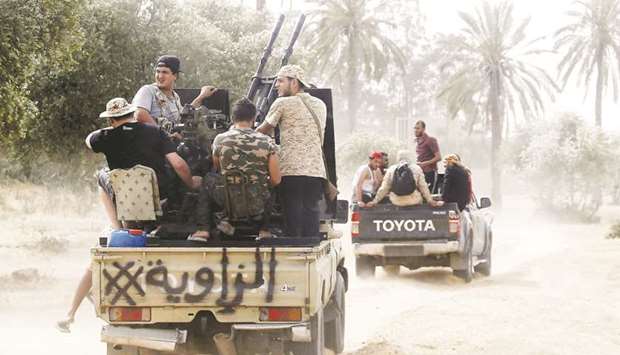Libyan eastern commander Khalifa Haftar has ruled out a ceasefire in the battle for Tripoli and accused the United Nations of seeking to partition Libya, according to an interview published by French newspaper Le Journal du Dimanche.
Haftar’s Libyan National Army (LNA) began an offensive in early April to take Tripoli from fighters loyal to Prime Minister Fayez al-Serraj’s Government of National Accord (GNA) which has the backing of the United Nations.
The LNA, which is allied to a parallel government in the east, has not been able to breach the southern defences of Tripoli.
The fighting has killed at least 510 people, forced 75,000 out of their homes and trapped thousands of migrants in detention centres. “Of course, the political solution is still the goal.
But to get back to politics, we must first finish with militias,” Haftar told the newspaper.
Haftar also said the head of UN mission to Libya, Ghassan Salame, was no longer impartial.
“Partition of Libya is maybe what our adversaries want. This is maybe what Ghassan Salame also wants.”
The flare-up in the conflict in Libya — which has been gripped by anarchy since Muammar Gaddafi was toppled in 2011 — began in early April, when the LNA advanced on the capital. Even though France and other Western countries officially back the Libyan government, some have supported Haftar as they see him as a bulwark against militias in the country. Macron had asked Haftar in a meeting held in Paris this week to make a public step towards a ceasefire, without much luck, a French official told Reuters.
UN CONCERN
The United Nations yesterday expressed concern over recent attacks on civilians and civil facilities in Tripoli, which has been at the centre of fighting between rival forces for more than a month.
The UN mission in Libya (UNSMIL) said it was very concerned at the reported kidnapping of a member of the advisory High Council of State in Tripoli. “UNSMIL is also concerned regarding the (Friday) air strike on the Rexos compound in Tripoli, a civilian facility located in a high populated area that has been used by members of the House of Representatives (parliament) for meetings,” the mission said.
“Shelling civilian targets and the kidnapping of civilians including political actors sends a worryingly anti-democratic message,” it added in a statement.
The mission also cited deadly attacks on ambulances, warning that such attacks could amount to war crimes.

Fighters loyal to the Libyan internationally-recognised Government of National Accord (GNA) step up to the front during clashes against forces loyal to strongman Khalifa Haftar, in the Airport Road Area, south of the Libyan capital Tripoli.
